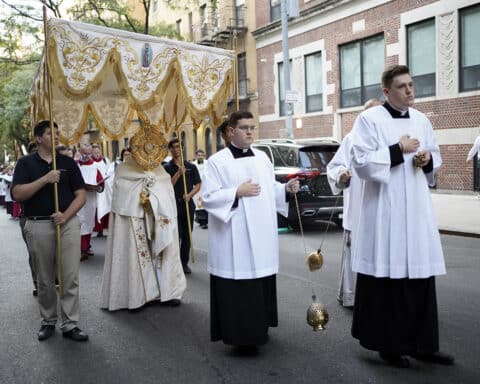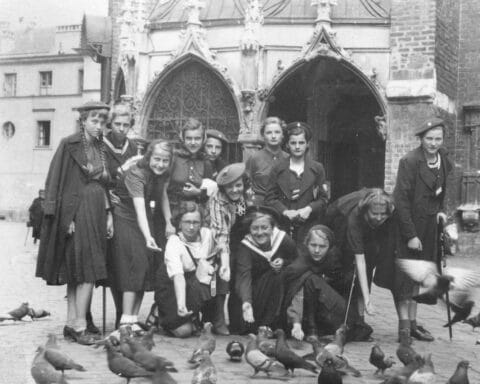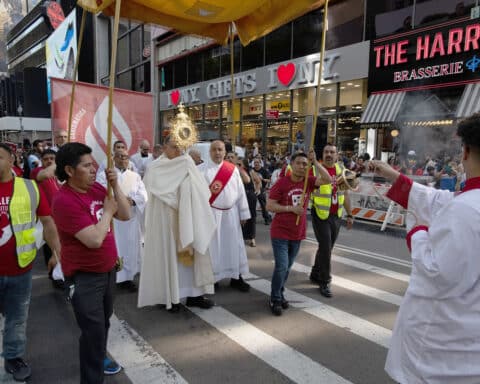(OSV News) — Switzerland’s Catholic bishops have vowed firm action against sexual abuse in the Church after a pilot study identified over 1,000 victims and 500 perpetrators, as six bishops faced accusations of covering up clergy crimes.
“Too many church leaders have acted irresponsibly for decades. They have failed to take the victims seriously and protected the perpetrators,” the nine-member bishops’ conference said Sept. 12. “This guilt cannot be brushed aside. It must be dealt with by attacking the mechanisms of power, the image of women and priests, and the sexual morality of the church.”
The Fribourg-based conference was reacting to the study, commissioned from Zurich University in 2021 and presented Sept. 12 in the northern Swiss city.
It said the 135-page document highlighted grave injuries caused by “personal misconduct” but also revealed “systemic problems.”
Those responsible for church policies that led to abuse “stood on the wrong side,” the bishops added.
“They chose to protect the church’s reputation rather than the dignity and integrity of the people exposed to unspeakable suffering. They preferred to transfer the perpetrators of these acts from one parish to another, thus allowing the abuse to continue,” they said.
The study was sponsored by the bishops’ conference, the Union of Major Superiors and Switzerland’s Central Catholic Conference, known by its German initials as RKZ,which is a grouping of cantonal church organizations. (Swiss “cantons” are jurisdictions similar to states.) It drew on church records and witness testimonies to identify 921 victims and 510 perpetrators of abuse that took place between 1950 and 2022, and is to be expanded with further material from church and state archives.
It said 74% of cases involved sexual molestation of mostly male minors, but added that only a “small proportion” of the suspected total had so far been researched and documented.
Until church guidelines on abuse were tightened in February 2019, the study said, convicted perpetrators had been “punished by the church very lightly or not at all,” while expert commissions established across the country’s six dioceses differed in their approaches and their level of “professionalism” varied.
Among its recommendations, the study said testimonies should be “systematically recorded” and “independent contact points” set up for reporting abuse.
It added that church archives in Switzerland and the Vatican should be opened to researchers, setting aside a requirement under Canon 489 of the Code of Canon Law for “documents of criminal cases” to be destroyed when those found guilty died or convictions lapsed.
Hurt by the Church
In the statement, signed by its president, Bishop Felix Gmür of Basel, the bishops’ conference said it was grateful that Zurich University was ready to continue its research, adding that it would “tackle necessary restructuring and reforms within the church,” and also “commit to a major cultural change.”
However, a former abuse victim told OSV News a “much stronger focus” on victims was needed and warned that some dioceses and religious orders remained unwilling to open their archives.
He added that the principle of “restorative justice” could offer an alternative to “complex legal and penal processes” by enabling abuse perpetrators to reach an agreement with their victims.
“Although sexual abuse is widespread here, only a small proportion involves priests, and it’s important that speech is now becoming genuinely free as more people feel called to speak out,” said Daniel Pittet, a university librarian and author of “Father, I Forgive You,” detailing his horrific story of childhood abuse by a Catholic priest.
“Beyond accepting what happened, that lies were told and mistakes made, it’s essential to recognize how much people were hurt by the church, rather than concentrating solely on preventive and punitive measures,” Pittet emphasized.
Publication of the pilot study came two days after the Swiss bishops’ conference confirmed the Vatican’s Dicastery for Bishops had ordered an inquiry after being notified that six Swiss bishops were accused of covering up abuse claims in a May letter from Msgr. Nicolas Betticher, a former bishops’ conference spokesman and vicar general of the Lausanne-Geneva-Fribourg Diocese.
The Sept. 10 communique said Swiss justice officials had also been notified of the claims, but added that the church inquiry, headed by Bishop Joseph Bonnemain of Chur, would submit its report by the end of 2023, enabling the Vatican to decide whether “criminal or disciplinary proceedings within the church” were required.
In a Sept. 10 interview with Switzerland’s International Catholic Press Agency, Msgr. Betticher denied leaking his letter to SonntagsBlick but said his aim in writing the letter had been to help abuse victims, while ensuring the Church is “taking responsibility, drawing consequences and removing perpetrators of abuse from the service of the church.”
Meanwhile, Bishop Bonnemain told SonntagsBlick Sept. 10 he believed “the cover-up has to end,” and said his inquiry would seek to “find out the truth completely and precisely.”
Helping victims
However, in his OSV News interview, Pittet, the abuse survivor, said far greater practical “effort and determination” would be needed, adding that only a handful of Swiss church staffers were currently engaged in helping victims, compared to hundreds in neighboring France.
He added that the names of the bishops had been published before the Zurich University pilot study, out of fears the study would “focus on the scale of abuse” without “naming any perpetrators or revealing significant detail.”
“The church can suspend or remove priests, but so much remains hidden in the dioceses,” said the 63-year-old married father of six, who is to be ordained a deacon in Rome Sept. 23.
“Victims are often in fragile situations and can’t take on the institutional church by themselves — they need help from law enforcers and others. But many of these potential allies are themselves under the church’s patronage. Many victims are forced to live out their personal dramas, without ever having a chance to recount their sufferings.”
Vatican procedures for tackling abuse, set out in 2011, require bishops’ conference guidelines and providing support services or care centers for survivors and were updated in 2019 with the motu proprio “Vos Estis Lux Mundi” (“You Are the Light of the World”), which was a mechanism for how the Church should deal with the abuse crisis, which included the investigations of bishops. These recommendations were reissued online in June 2022.
Abuse in other countries
Besides Switzerland, independent reports on clerical abuse have been commissioned by bishops’ conferences in France, Germany, Portugal and Spain, and are being considered in other countries, including Poland.
In a Sept. 12 press communique, the Swiss bishops’ conference, Union of Major Superiors and RKZ said 2.5 million Swiss francs ($ 2.8 million) had been earmarked for further clerical abuse research by Zurich University in 2024-2026.
It added that this would “pave the way for a critical analysis on a national scale.” Church leaders also would address “systemic problems,” said the press statement. The bishops’ conference said it also would fund independent hotlines for reporting abuse and ensure all church archives were maintained “without time limits.”
“Members of the Swiss bishops’ conference recognize the Church’s guilt — they assure they will do everything humanly possible so those affected obtain justice,” the statement said.
“Behind each case, there is a human being, a face, a life destroyed. Behind each case, there is immeasurable suffering which has not been identified or recognized, but minimized, concealed and suppressed. Behind each number, there is a family, an entourage who suffered and still suffers.”
Monika Dommann and Marietta Meier, researchers who conducted the research for the University of Zurich, warned Sept. 12 that the abuse cases included in the pilot study were “only the tip of the iceberg.”





